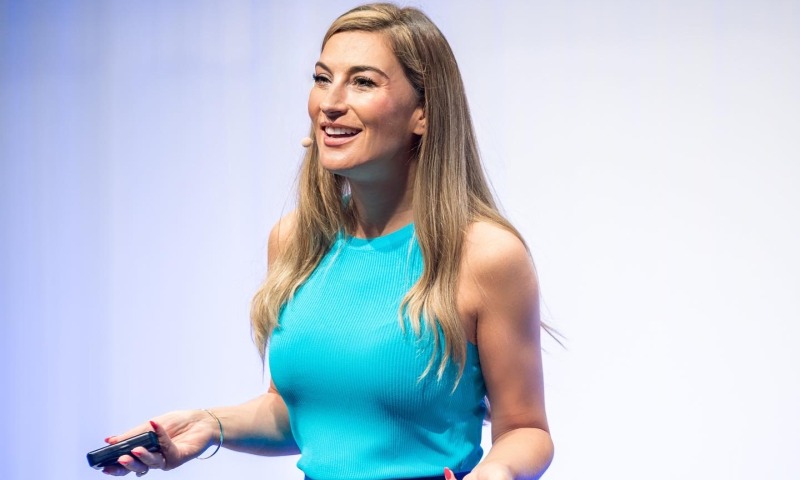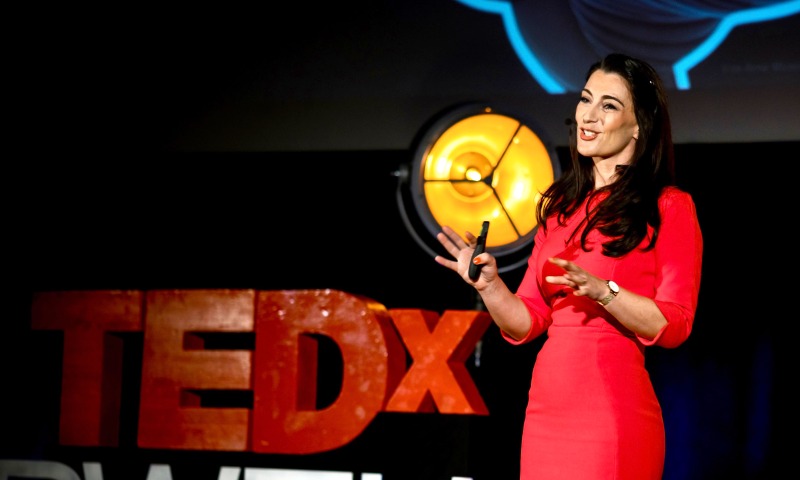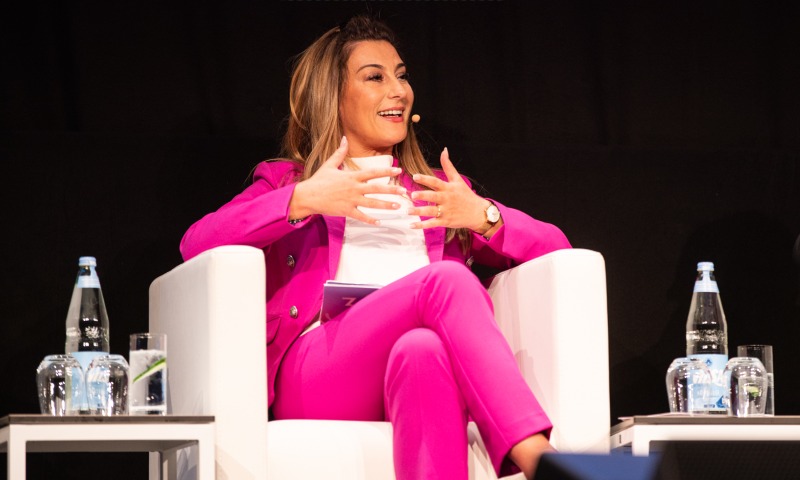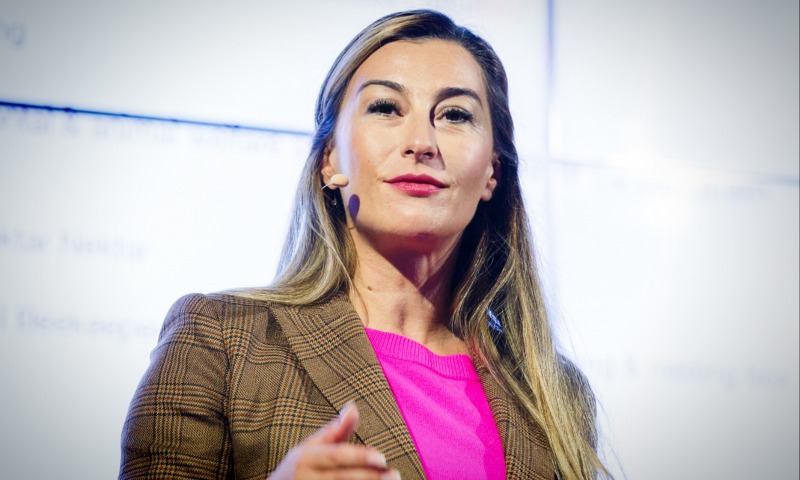Katrin-Cécile Ziegler is a German tech expert, international keynote speaker, and environmental economist. She has served as a lecturer, tech journalist, and advisory board member, with a focus on sustainability and digital innovation. With numerous media awards and as a sought-after international influencer, she inspires and empowers others in the tech industry.
On LinkedIn, Katrin Ziegler boasts a following of over 20k, and her influence extends internationally as she is sought after for collaborations with major tech brands. Katrin is a strong advocate for digital ethics and has delivered a compelling TED Talk on brain-computer interfaces. Her dedication to responsible technology and thought-provoking insights have made her a respected figure in the industry and media/TV.
Recently, in an exclusive interview with Digital First Magazine, Katrin shared her insights on the key digital transformation trends to watch out for, career trajectory, most challenging aspect of her role as an international tech influencer and content creator, secret mantra behind her success, and much more. The following excerpts are taken from the interview.
According to you, which are the three significant digital transformation trends to keep an eye on in 2023?
These are 3 trends that are new to many but will have a long-term significant impact on our future: Sustainability, Digital Products (every data is product) and generative AI.
The important thing is that we should no longer view any trend in isolation from one another. They are also interrelated and should be delivered together.

Katrin, please take us through your professional journey. How has been your experience as a keynote speaker, lecturer, tech journalist and tech influencer and what are the major takeaways from each of the roles?
Being a lecturer for tech-trends and digital ethics has been both rewarding and challenging. It has given me the chance to educate and empower students by sharing my expertise and experience. I have had the privilege of teaching various technology-related subjects, and witnessing the growth and enthusiasm of my students has been incredibly gratifying. One major takeaway from this role is the importance of adaptability and continuous learning, as technology is constantly evolving. This is also where I leave my bubble, because the young students’ way of thinking and questions change over time and also provide me with valuable impulses.
Keynote speaking is an incredibly fulfilling experience for me. I also love being on stage. It allows me to share my knowledge, insights, and passion for technology with diverse audiences. The opportunity to address large gatherings and industry conferences has given me a platform to inspire and motivate others, especially women, to pursue careers in tech. The major takeaway from this role is the power of communication and the ability to influence positive change through impactful speeches.
As a tech journalist and international tech influencer, I have the opportunity to stay at the forefront of the latest trends, innovations, and breakthroughs in the tech industry. This role allows me to delve deep into research, interview international high-level industry experts, and create insightful content that informs and engages readers. The major takeaway from this role is the ability to distill complex information into accessible content that educates and empowers readers. It has taught me the power of storytelling, visual communication, and building a personal brand. One other major takeaway from this role is the importance of consistently producing high-quality content that adds value and resonates with the target audience. I have more than 20k followers on LinkedIn and have already done very exciting collaborations with more than 20 brands, including very big tech companies like IBM or INTEL.

What would you say are the most challenging aspects of your job as a tech influencer and content creator?
The tech industry can be very complex and technical, especially when it comes to topics like artificial intelligence or cybersecurity. Simplifying complex concepts and making them accessible to a broad audience is a challenge. This requires storytelling and simple, understandable language without buzzwords. I enjoy that. I would prefer that even a child understands my content.
But creating such “simple” content is very time consuming and challenging. It requires time management to accomplish alongside my other jobs, managing multiple projects and meeting deadlines.
The pressure is also getting stronger as the battle for attention on platforms like LinkedIn increases and there are also online trolls. Here, it’s just as important to take care of your own mental health. Enjoying content creation and interacting with my community should always come first.
Being a tech influencer and content creator is also incredibly rewarding. I get to share my values with others, inspire them, alleviate their fears and educate them. I think we should all become influencers in the sense that we want to help shape our future and take up our own space to influence. It’s definitely a big responsibility, too.
As keynote speaker at the TEDx Conference, you shed light on the topic, “How Mind-Reading Tech conquers your brain”. What made you choose this topic?
I wanted to address the fascinating yet controversial advancements in brain-computer-interfaces, a field of neurotechnology. I believe it’s crucial to bring attention to the potential opportunities and risks that arise from mind-reading technologies. On one hand, such technologies hold the promise of revolutionizing healthcare, communication, and education, offering incredible possibilities for individuals with disabilities and unlocking new frontiers of human potential. On the other hand, there are concerns regarding privacy, security, and ethical implications surrounding the invasive nature of these technologies. By shedding light on both the chances and risks, I aimed to spark a thought-provoking dialogue, foster awareness, and encourage responsible development and deployment of neurotechnologies. It is essential for society to navigate this field with caution. Hence, as a member of the International Neuroethics Society, I advocate for the development of neurorights that safeguard us against misuse and promote ethical applications. For me, Brain-Computer Interfaces (BCIs) are one of the most fascinating technologies, and their development is much further along than many people realize.

Tell us about your guiding principles and some of the initiatives taken by you as a digital expert and environmental economist.
I firmly believe in the power of technology to address environmental challenges. Tech is not the sole solution, but I believe that we need to think and deliver together about two of our greatest human challenges – the climate crisis and digital transformation. As a digital expert, I strongly advocate for the adoption of sustainable practices in the technology industry. That´s why I am proud to serve as an advisory board member at the largest European Climate Innovation Foundation of Stuttgart. We support initiatives and startups in the field of greentech and other innovations. Our board comprises a diverse group of experts, which I appreciate because it allows us to integrate and consider multiple perspectives.
The concept of the circular economy, which aims to minimize waste and maximize resource efficiency, is also close to my heart. That’s why I volunteered as a juror for the international “Green Alley Award.” We use it to promote startups that find innovative approaches.
On the other hand, we face another problem for global implementation, which is digital inclusion. Inclusion and accessibility are crucial aspects of the digital world. As the German ambassador for the European Digital Society, I am committed to bridging the digital divide and ensuring that everyone has equal access to technology and digital opportunities. We still have a long way to go here. Women are particularly often disadvantaged here. I have been a mentor for many years and want to encourage young women, especially in a digital world that offers so many opportunities.
You have been a recipient of numerous media awards and accolades over the years. What is the secret mantra behind your success?
I am grateful for all the opportunities I have had. A key factor that has always empowered myself: I accept every interesting challenge, no matter how difficult it sounds, and grow from it. I never say no. It sounds simple, but it’s a contract I have made with myself. Doubts are always a part of the journey; in fact, they are crucial. Doubts can drive us to uncover the truth. I don’t let my doubts defeat me; instead, I explore them. And often, I discover that the fears accompanying certain doubts were unnecessary. This realization builds long-term courage.
An important booster for my successes has undoubtedly also been my reach. Social media has enabled me to accomplish a lot. I was able to establish a personal brand and build a strong network early on. I highly recommend young people to start building a network and leverage its power for their own growth.

Can you name a person who has had a tremendous impact on you as a leader? Maybe someone who has been a mentor to you? Why and how did this person impact your life?
Certainly, my parents played a significant role in shaping my journey. My late father was a feminist who always encouraged and supported me. My mother is a creative artist who constantly reinvents herself. Both of them have been a great source of inspiration. However, when it comes to venturing into the tech world, I had to find my own path. I didn’t have many female role models in this field, so I had to take some detours to find my place. From that, I gained a lot of valuable experience. It may sound cliché, but the most important thing is still believing in oneself. If you can’t find professional role models, seek out individuals who have a strong belief in themselves and let their confidence inspire you. You will find your way.
What is your biggest goal? Where do you see yourself in 5 years from now?
In 5 years? It’s fascinating that I`ve never seriously pondered the question to myself. Not making concrete plans has worked for me, allowing me to recognize opportunities and explore new paths. I understand that it may be a matter of personal preference. Being a multitasker and needing change and variety to be happy aligns well with my approach. Remaining open to possibilities seems to be my overarching plan.
However, it’s natural to have wishes or goals as well. I aspire to find the time and opportunity to inspire even more people internationally with my keynotes from various backgrounds around the world.
Expanding my reach and making a positive impact on a broader scale is an aspiration worth pursuing.
What piece of advice would you give to aspiring female professionals?
Find an inner circle of other professionals whom you can trust and with whom you can openly discuss your insecurities and doubts. You’ll discover that we all face these struggles. It will provide you with strength, make certain obstacles appear smaller, and help you find support. While you can make progress on your own, you won’t go far without a network. Build trust in yourself and others, for it is crucial. Everything else can be learned. I tried it out myself.






